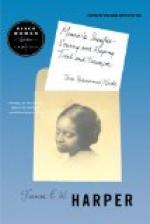Louis, too, with his practical turn of mind, used his influence in teaching them to be saving and industrious, and to turn their attention towards becoming land owners. He attended their political meetings, not to array class against class, nor to inflame the passions of either side. He wanted the vote of the colored people not to express the old hates and animosities of the plantation, but the new community of interests arising from freedom.
For awhile the aspect of things looked hopeful. The Reconstruction Act, by placing the vote in the hands of the colored man, had given him a new position. There was a lull in Southern violence. It was a great change from the fetters on his wrist to the ballot in his right hand, and the uniform testimony of the colored people was, “We are treated better than we were before.”
Some of the rebels indulged in the hope that their former slaves would vote for them, but they were learning the power of combination, and having no political past, they were radical by position, and when Southern State after State rolled up its majorities on the radical side, then the vials of wrath were poured upon the heads of the colored people, and the courage and heroism which might have gained them recognition, perhaps, among heathens, made them more obnoxious here.
Still Louis and Minnie kept on their labors of love; their inner lives daily growing stronger and broader, for they learned to lean upon a strength greater than their own; and some of the most beautiful lessons of faith and trust they had ever learned, they were taught in the lowly cabins of these newly freed people.
Often would Minnie enter these humble homes and listen patiently to the old story of wrong and suffering. Sympathizing with their lot, she would give them counsel and help when needed. When she was leaving they would look after her wistfully, and say,
“She mighty good; we’s low down, but she feels for we.”
And thus day after day of that earnest life was spent in deeds and words of love and kindness.
But let us enter their pleasant home. Louis has just returned from a journey to the city, and has brought with him the latest Northern papers. He is looking rather sober, and Minnie, ready to detect the least change of his countenance, is at his side.
“What is the matter?” Minnie asked, in a tone of deep concern.
“I am really discouraged.”
“What about?”
“Look here,” said he, handing her the New York Tribune. “State after State has rolled up a majority against negro suffrage. I have been trying to persuade our people to vote the Republican ticket, but to-day, I feel like blushing for the party. They are weakening our hands and strengthening those of the rebels.”
“But, Louis, they were not Republicans who gave these majorities against us.”




